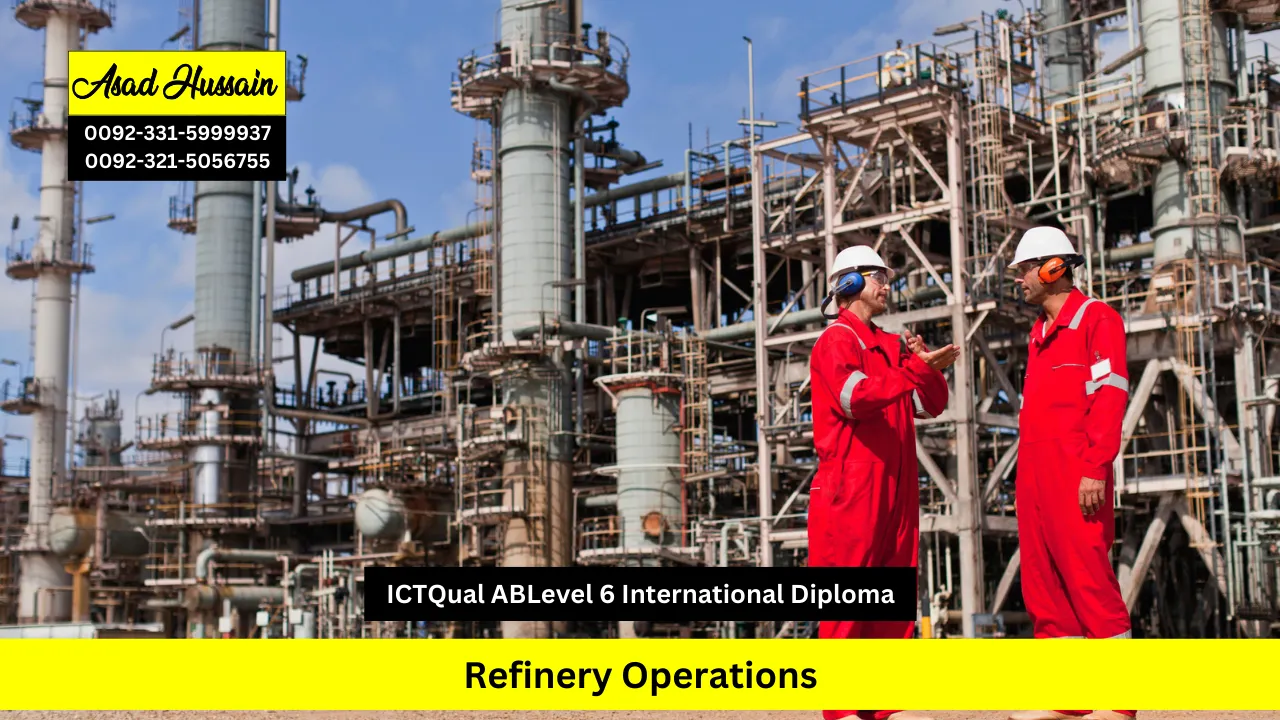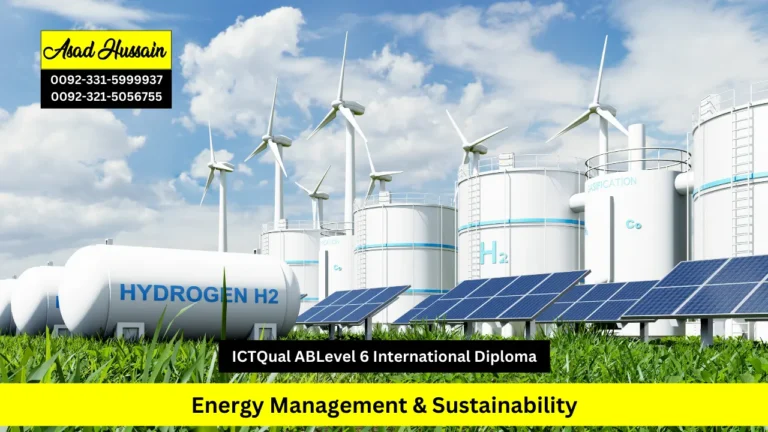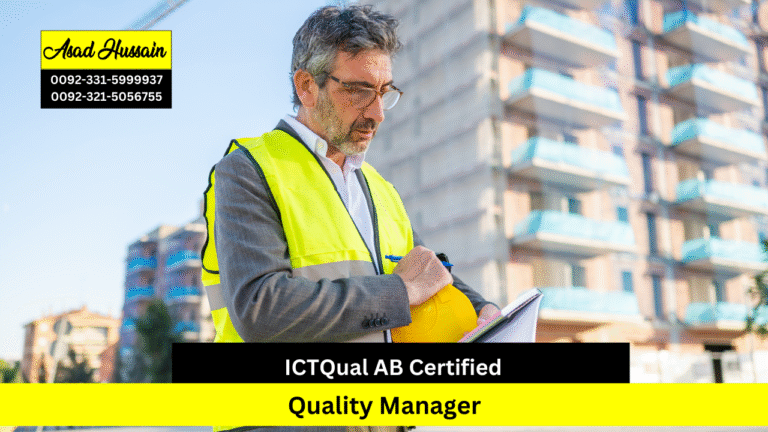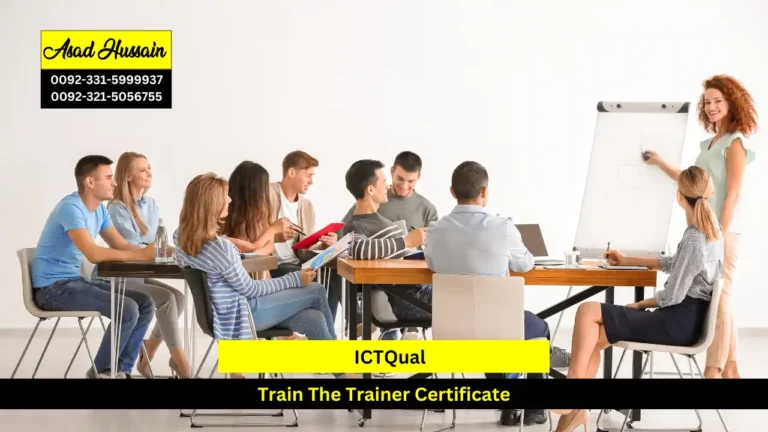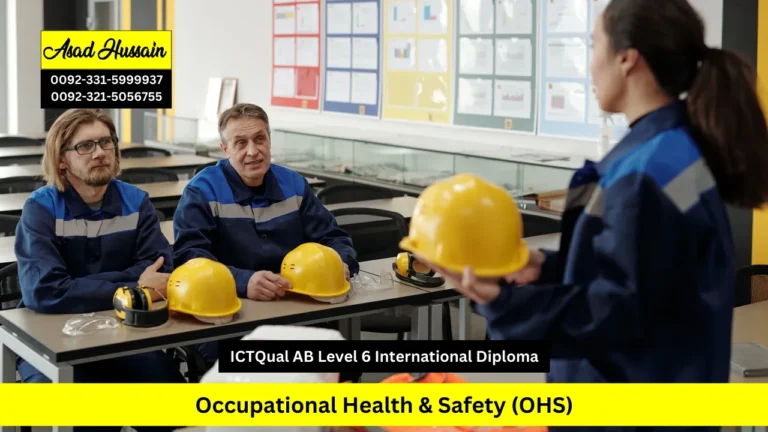The ICTQual AB Level 6 International Diploma in Refinery Operations is a comprehensive qualification designed to prepare learners for leadership roles in the refining and petrochemical industry. Refinery operations are at the heart of the global energy sector, ensuring the efficient conversion of crude oil into valuable fuels and products that power economies worldwide. Skilled professionals are in high demand to manage processes, maintain safety, and drive innovation in this critical industry.
ICTQual ABLevel 6 International Diploma in Refinery Operations provides learners with in-depth knowledge of refining processes, equipment operations, safety protocols, environmental compliance, and quality control systems. It emphasizes both theoretical understanding and practical application, enabling learners to apply advanced concepts to real-world refining challenges.
Graduates of this diploma will gain essential skills in refinery process optimization, risk management, project planning, and operational efficiency. The course also integrates the latest digital tools and sustainability practices, equipping learners to contribute to modern, environmentally responsible refinery operations.
ICTQual ABLevel 6 International Diploma in Refinery Operations is designed for professionals, students, and career changers seeking to build a successful career in refinery management, petrochemical industries, or related fields. By completing the ICTQual AB Level 6 International Diploma in Refinery Operations, learners will enhance their technical expertise, improve employability, and earn a globally recognized qualification valued across the oil and gas sector.
Program Highlights
Study Units
Year 1 – Foundation in Refinery Operations
- Principles of Chemical Engineering
- Introduction to Petroleum Refining
- Crude Oil Properties and Analysis
- Refinery Process Units Overview
- Distillation Principles and Applications
- Heat and Mass Transfer in Refining
- Introduction to Catalysts and Chemical Reactions
- Process Instrumentation and Control Basics
- Health, Safety, and Environmental Awareness
- Industrial Laboratory Techniques
- Technical Report Writing
- Introduction to Process Simulation Software
Year 2 – Intermediate Refinery Operations
- Advanced Distillation and Separation Techniques
- Hydrocracking and Hydrotreating Processes
- Fluid Catalytic Cracking (FCC) Operations
- Process Control and Automation in Refineries
- Energy Management and Efficiency in Refining
- Reactor Design and Optimisation
- Process Safety Management
- Refinery Production Planning
- Quality Control and Assurance in Refining
- Environmental Management and Sustainability
- Petroleum Product Blending Techniques
- Data Analysis and Technical Communication
Year 3 – Advanced Refinery Operations
- Advanced Process Optimisation and Troubleshooting
- Refinery Project Management
- Catalysts and Reaction Kinetics in Depth
- Advanced Process Simulation and Modelling
- Corrosion and Maintenance in Refineries
- Energy Transition and Cleaner Refining Technologies
- Risk Assessment and Hazard Analysis
- Advanced Laboratory Techniques and Process Testing
- Supply Chain and Logistics in Refining
- Capstone Project in Refinery Operations
- Professional Development and Leadership in Energy
- Strategic Decision-Making in Refinery Management
Meeting the entry requirements for the ICTQual AB Level 6 International Diploma in Refinery Operations ensures that learners are fully prepared to succeed in this advanced-level program. These requirements are structured to support diverse learners while maintaining the academic and professional rigor of the course.
Age Requirements
- Applicants must be 18 years or older at the time of enrollment in ICTQual ABLevel 6 International Diploma in Refinery Operations.
- Learners are expected to demonstrate maturity, discipline, and readiness for advanced study.
Educational Requirements
- A Level 5 diploma, higher national diploma, or equivalent qualification in engineering, petroleum studies, chemical sciences, or a related field.
- Candidates with strong academic performance in science or engineering subjects will be prioritized.
Professional Experience
- A minimum of two years of work experience in refinery operations, petrochemicals, or oil and gas industries is recommended.
- In certain cases, relevant industry experience may compensate for formal academic qualifications.
English Language Proficiency
- Applicants must demonstrate adequate proficiency in English reading, writing, and communication skills.
- This may be proven through IELTS, TOEFL, or equivalent certifications, or prior study/work experience in an English-speaking environment.
The entry requirements for the ICTQual AB Level 6 International Diploma in Refinery Operations are carefully designed to ensure learners have the academic foundation, industry exposure, and language skills necessary to excel. By attracting motivated learners from varied backgrounds, the diploma fosters a dynamic learning environment and produces graduates who are ready to meet the evolving demands of the global refining and petrochemical industry.
The ICTQual AB Level 6 International Diploma in Refinery Operations equips learners with advanced technical knowledge, operational skills, and leadership capabilities required to excel in the petroleum refining and energy sectors. Graduates will gain a comprehensive understanding of refinery processes, safety standards, and sustainability practices while developing practical expertise for real-world industrial applications.
Year 1 – Foundation in Refinery Operations
Principles of Chemical Engineering
- Understand fundamental chemical engineering principles applied in refinery processes.
- Analyze mass and energy balances for basic process units.
- Apply problem-solving techniques to typical refinery process calculations.
Introduction to Petroleum Refining
- Describe the refining industry and its global significance.
- Understand the flow of crude oil through various process units.
- Identify key components and stages in refinery operations.
Crude Oil Properties and Analysis
- Analyze the physical and chemical properties of crude oil.
- Conduct laboratory-based crude oil testing and quality assessment.
- Interpret analytical results to determine refining strategies.
Refinery Process Units Overview
- Understand the function of major refinery units such as distillation, cracking, and reforming.
- Interpret process flow diagrams (PFDs) and equipment layouts.
- Apply theoretical knowledge to laboratory simulations and exercises.
Distillation Principles and Applications
- Understand separation techniques and principles of distillation.
- Analyze binary and multi-component distillation processes.
- Apply distillation concepts to refinery operations and product recovery.
Heat and Mass Transfer in Refining
- Understand heat exchangers, reactors, and mass transfer operations.
- Solve heat and mass transfer problems relevant to refinery systems.
- Apply principles to improve process efficiency.
Introduction to Catalysts and Chemical Reactions
- Understand catalytic reactions and their role in refining processes.
- Analyze reaction kinetics for simple refinery reactions.
- Apply theoretical knowledge to laboratory and simulated experiments.
Process Instrumentation and Control Basics
- Understand instrumentation for temperature, pressure, and flow measurement.
- Apply basic process control strategies for operational stability.
- Use measurement data to monitor and improve refinery performance.
Health, Safety, and Environmental Awareness
- Identify hazards in refinery operations and implement safety measures.
- Apply environmental management practices and sustainability standards.
- Adhere to occupational health and safety regulations in industrial settings.
Industrial Laboratory Techniques
- Conduct hands-on experiments in refinery process units.
- Analyze and record experimental data accurately.
- Apply laboratory findings to improve operational understanding.
Technical Report Writing
- Develop professional technical reports and documentation.
- Present experimental and operational findings clearly and accurately.
- Apply structured formats for industrial and academic reporting.
Introduction to Process Simulation Software
- Utilize simulation tools to model refinery processes.
- Analyze system behavior and optimize operational parameters virtually.
- Validate simulation results against laboratory or field data.
Year 2 – Intermediate Refinery Operations
Advanced Distillation and Separation Techniques
- Apply advanced separation techniques for complex refinery streams.
- Optimize column operations for maximum efficiency.
- Use process data to troubleshoot and improve separation units.
Hydrocracking and Hydrotreating Processes
- Understand principles of hydrocracking and hydrotreating.
- Analyze reaction kinetics and operational parameters.
- Apply process knowledge to optimize refinery output.
Fluid Catalytic Cracking (FCC) Operations
- Comprehend FCC unit operations and catalyst usage.
- Evaluate efficiency and conversion rates.
- Implement operational strategies for consistent production quality.
Process Control and Automation in Refineries
- Implement automated control strategies for refinery processes.
- Monitor and adjust key variables to maintain stability.
- Use digital tools for predictive maintenance and operational efficiency.
Energy Management and Efficiency in Refining
- Analyze energy consumption patterns in refinery operations.
- Apply energy optimization strategies for cost reduction.
- Monitor KPIs to enhance process sustainability.
Reactor Design and Optimisation
- Understand refinery reactor design principles.
- Evaluate reaction kinetics and process parameters.
- Apply optimization techniques to maximize yield.
Process Safety Management
- Conduct safety audits and hazard analyses.
- Implement risk mitigation strategies and emergency procedures.
- Ensure compliance with international safety standards.
Refinery Production Planning
- Develop production schedules and resource allocation plans.
- Monitor operational performance and adjust plans for efficiency.
- Apply project management techniques in refinery operations.
Quality Control and Assurance in Refining
- Implement quality control methods in product testing.
- Ensure compliance with industry standards and specifications.
- Analyze quality data to implement corrective measures.
Environmental Management and Sustainability
- Evaluate environmental impact of refinery processes.
- Implement sustainable operational practices.
- Monitor compliance with environmental regulations.
Petroleum Product Blending Techniques
- Understand blending principles for gasoline, diesel, and other products.
- Apply quality control measures in blending operations.
- Optimize product specifications for market requirements.
Data Analysis and Technical Communication
- Collect and interpret operational data effectively.
- Communicate findings through reports and presentations.
- Apply data-driven decisions to improve refinery performance.
Year 3 – Advanced Refinery Operations
Advanced Process Optimisation and Troubleshooting
- Diagnose operational challenges and implement corrective actions.
- Optimize process units for energy efficiency and output.
- Apply advanced problem-solving techniques to refinery systems.
Refinery Project Management
- Develop project plans including budgeting, scheduling, and resources.
- Evaluate project risks and implement mitigation strategies.
- Monitor project milestones and ensure timely delivery.
Catalysts and Reaction Kinetics in Depth
- Analyze complex catalytic reactions and kinetics.
- Optimize catalyst performance in refinery processes.
- Apply laboratory and simulation methods for reaction studies.
Advanced Process Simulation and Modelling
- Use simulation software for detailed process analysis.
- Model different scenarios to predict operational outcomes.
- Apply simulation results to decision-making in real plants.
Corrosion and Maintenance in Refineries
- Understand corrosion mechanisms and mitigation strategies.
- Develop preventive maintenance schedules.
- Apply inspection and reliability techniques for operational safety.
Energy Transition and Cleaner Refining Technologies
- Evaluate low-carbon and sustainable refining technologies.
- Assess environmental impacts and implement cleaner alternatives.
- Propose innovative solutions for energy transition initiatives.
Risk Assessment and Hazard Analysis
- Conduct comprehensive risk evaluations of refinery operations.
- Develop emergency response and contingency plans.
- Apply best practices for workplace and environmental safety.
Advanced Laboratory Techniques and Process Testing
- Perform complex experiments on refinery systems.
- Analyze operational data for performance improvements.
- Implement laboratory results in practical applications.
Supply Chain and Logistics in Refining
- Optimize the movement of raw materials and finished products.
- Apply supply chain management principles to refinery operations.
- Monitor logistics performance for efficiency and cost reduction.
Capstone Project in Refinery Operations
- Conduct an independent project integrating theoretical and practical knowledge.
- Solve real-world refinery challenges through research and analysis.
- Present findings in professional technical reports.
Professional Development and Leadership in Energy
- Develop leadership and managerial skills for refinery operations.
- Apply professional ethics and industry standards in decision-making.
- Promote team performance and continuous improvement.
Strategic Decision-Making in Refinery Management
- Apply strategic thinking to operational and project decisions.
- Balance efficiency, safety, and sustainability in decision-making.
- Demonstrate measurable impact on refinery performance.
Upon completion, learners will have the advanced technical knowledge, operational expertise, and leadership capabilities to excel in refinery operations, project management, and energy sector roles globally
The ICTQual AB Level 6 International Diploma in Refinery Operations is designed for motivated individuals aiming to advance their expertise and careers in the refining and petrochemical industry. This program attracts a wide range of learners who share a commitment to technical excellence, sustainability, and innovation in refinery operations.
Educational Instructors and Trainers
- Professionals in academic or vocational training who want to deepen their technical expertise in refinery operations.
- Instructors aiming to integrate practical refinery knowledge into their teaching curriculum.
Environmental Advocates and Activists
- Individuals committed to promoting sustainable practices in refinery operations.
- Advocates seeking technical insights to address environmental challenges and regulatory compliance.
Students and Recent Graduates
- Learners with a background in engineering, petroleum studies, or chemical sciences who want to build specialized refinery knowledge.
- Graduates seeking a recognized qualification to increase employability in the global oil and gas sector.
Career Changers
- Professionals from related industries aiming to transition into refinery operations or petrochemical roles.
- Individuals looking to develop new technical and management skills to pursue opportunities in energy and refining.
Policy Makers and Regulators
- Government officials and regulators responsible for overseeing refinery safety and compliance.
- Policy makers seeking technical expertise to develop balanced regulations for the refining and petrochemical industry.
The ICTQual AB Level 6 International Diploma in Refinery Operations is ideal for learners from diverse academic and professional backgrounds who are committed to advancing their careers in the oil, gas, and petrochemical industries.

